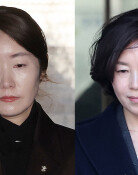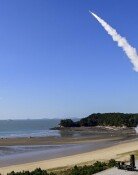Bad Economy Polarizes Consumption Pattern
Bad Economy Polarizes Consumption Pattern
Posted August. 01, 2004 22:14,
The economic recession is polarizing the consumption pattern, with sales of luxuries such as cars, refrigerators and whiskey decreasing while that of typical citizens items such as Soju and Ramen soar.
In response to this, the government has tentatively decided to postpone its plan to increase the tax on whiskey and Soju starting next year.
A report released yesterday by the Finance and Economy Ministry and National Statistical Office shows the shipment index of domestic consumption goods for the second quarter of this year (April through June) dropped to 99.8, down 2.8 points from the same period last year. It is the lowest such figure since the first quarter of 2001, when the index fell to 96.7.
The National Statistical Office calculates the shipment index of domestic consumption goods after examining factory shipments for 647 items produced domestically. The index uses the average of the year 2000 as a benchmark, set at 100. When the index passes 100, it indicates the shipment quantity is more than that of year 2000.
The shipment index for durable consumer goods that are usually used for more than a year, such as cars, refrigerators and microwaves, fell 9 points from the same quarter of last year, to 100.5.
However, the shipment index for nondurable consumer goods, including Soju and Ramen, increased 0.1 point from the same period of last year, to 99.5.
In particular, liquors such as whiskey (-25.9 percent) and beer (-0.6 percent) sold less, while sales of Soju jumped as much as 16.3 percent.
In fact, the Soju consumption of the first half of this year was 549,000 kl, a 6.8-percent increase compared to the same period of last year. This level of consumption is the second-largest after the second half of 1999 sales of 552,000 kl.
However, only 4,967 kl of whiskey were sold the first half of the year, a 16.9-percent fall from the same period of last year, and a record low since the first half of 1998 (4569 kl), when the IMF crisis hit the nation.
Beer consumption dropped to 833,000 kl, a 1.18 percent decrease from the same period of last year, and the lowest among half-year figures since the first half of 2000 (747,000 kl).
We decided to hold the plan to increase a liquor tax imposed on Soju and whiskey, which was supposed to be included in a draft amendment of the liquor tax law and be presented to a regular assembly session of the second half of this year, considering severely stagnant domestic consumption, said Kim Nak-heoi, consumption tax system section chief at the Finance Ministry. He added, We do not have plans to adjust a tax rate on other consumer goods for now.
Jin-Hup Song jinhup@donga.com







